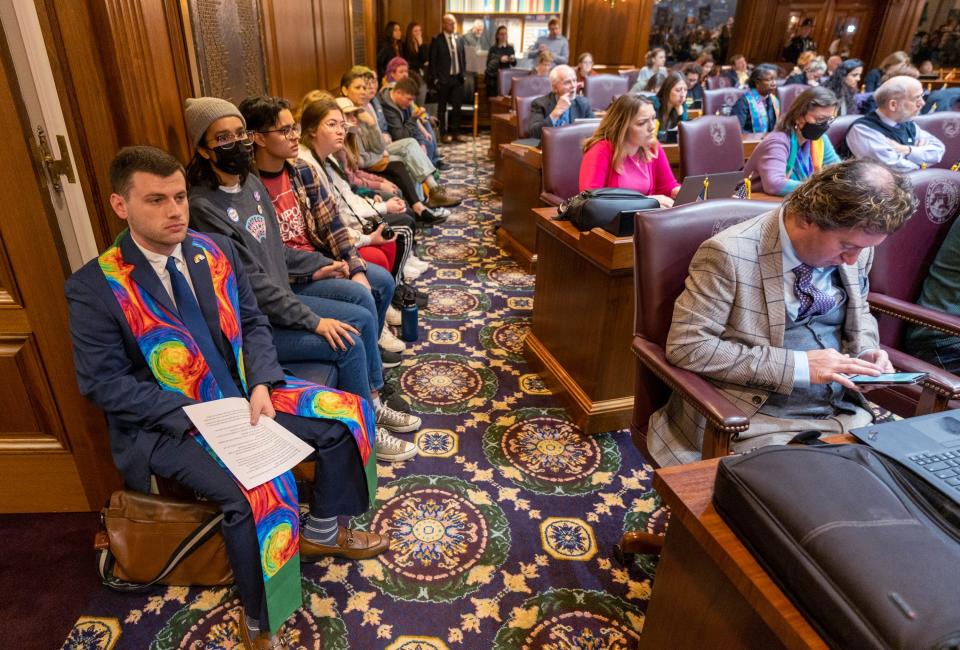Book bans, service ponies and throwing stars: New Indiana laws start July 1
As in 2022, social issues dominated this year's Indiana legislative session.
A handful of laws affecting the lives of transgender and LGBTQ people passed. Lawmakers also focused on education, passing bills that tackle political viewpoints in class, banning books from school libraries and more.
One law authored in the Senate bans doctors from providing gender transition care to minors. It would have taken effect this summer, but a federal judge has issued a preliminary injunction after a lawsuit challenged the new law.
Here's a look at some of the other laws that go into effect July 1:
Insurers must pass along drug rebates
If you have an individual health care plan, insurers must pass along at least 85% of the rebates they negotiate with drug manufacturers in exchange for covering their drug. For those who have a health plan through their employers, 100% of the rebates must be passed along — but the employer decides how to apply the savings.
Indiana General Assembly 2023: Doctors concerned noncompete ban exclusion could deprive Indiana of specialists
Throwing stars are legal
A new Indiana law classifies throwing stars alongside knives and other sharp weapons. They can be legally possessed, but can't be carried on school property or a school bus.
Domestic violence suspects can't be released for 24 hours
Current law calls for an 8-hour 'cooling off' period after a domestic violence arrest. Under the new law, it's increased to 24 hours. Crimes included are battery, domestic battery, strangulation, rape, sexual battery, invasion of privacy, criminal stalking, criminal recklessness, criminal confinement, burglary and residential entry.
▶ Read Senate Enrolled Act 158
GPS tracking will be prohibited by protective orders
A law introduced by the state senate this year addressed criminal use of GPS tracking. A prohibition on tracking devices is now included in the list of conditions a court can impose with an order of protection. The law also addresses the use of a tracking device to stalk someone, increasing the charge from a Level 6 to a Level 5 felony if such a device is used.
▶ Read Senate Enrolled Act 161
Colleges can't refuse to provide a transcript if you owe them money
If a current or former student of a state or private educational institution owes a debt of $1,000 or less, the school can't refuse to provide a transcript. Institutions are also not allowed to charge a higher fee for transcripts because of a debt.
▶ Read Senate Enrolled Act 404
Automatic speed cameras coming to highway worksites
A new law allows INDOT to establish a worksite speed control pilot program in as many as four construction zones in Indiana. When workers are present, Hoosiers caught speeding 11 mph or more over the speed limit will receive a warning the first time. A second violation will cost $75, and additional violations will cost $150 each.
▶ Read House Enrolled Act 1015
Police can enforce a 25-foot buffer around investigating officers
Starting July 1, if police have ordered someone to stop approaching and that individual "knowingly or intentionally" comes within 25 feet of an emergency incident, that person can be charged with a Class C misdemeanor.
▶ Read House Enrolled Act 1186
Food delivery apps need a restaurant's permission to include them
To help give restaurant owners more control over their services and customer experience, a new law is meant to deter "scraping" their information to include them on apps like GrubHub or Doordash. Instead, these apps must get the restaurant's permission before listing them on the app.
▶ Read House Enrolled Act 1279
A voter or family member must request an absentee ballot application
To vote by mail-in absentee ballot, voters must be eligible through an excuse requirement. After July 1, applications will no longer be sent out without a request from a voter or family member. Employees at nursing homes or assisted living facilities can no longer send the request.
▶ Read House Enrolled Act 1334
Only dogs and miniature ponies can be service animals
A new law cracks down on the types of animals that can be designated as service animals. It also sets requirements for when service animals are allowed in public spaces. Previously, the law did not define the type of animal that could be a service animal.
The law reads that "a public accommodation shall make reasonable modifications in policies, practices, or procedures to permit the use of a miniature horse by an individual with a disability."
▶ Read House Enrolled Act 1354

New review process for books in school libraries
Librarians in schools could face a felony if they provide materials considered obscene or harmful under this new law. Most libraries already had a procedure established for parents to appeal books they don't think should be in the collection, but now it's a requirement to review books appealed by parents. Some Hoosiers are concerned it will lead to banning books about the LGBTQ community and people of color.
▶ Read House Enrolled Act 1447
Pharmacists can write prescriptions for birth control
Adults seeking birth control — in the form of pills, patches or rings — can get a prescription written and filled by a pharmacist after a full health screening. The law will help those who can't get a prompt appointment with a physician, work difficult hours or can't get to a doctor's office receive short-term contraceptive care.
▶ Read House Enrolled Act 1568

Schools must notify parents about gender pronoun or name changes
One new piece of legislature started to prohibit teaching about gender identity and sexual orientation in lower grade levels. Later, lawmakers added language to prohibit schools from calling students by names or pronouns "inconsistent" with the sex assigned to them at birth without written permission from their parents. The bill was pared down, and the new law only requires notifying parents of students' request to change pronouns, rather than requiring parental consent to use a different name or pronoun.
Indiana General Assembly 2023: Indiana lawmakers pledged to force hospitals to lower prices. The results are mixed.
The ACLU of Indiana filed a lawsuit against this new law on behalf of an Indianapolis Public Schools teacher, claiming it is overly vague and infringes on her free-speech rights. The ACLU is seeking a preliminary injunction in federal court, but a decision is not expected before the law goes into effect.
▶ Read House Enrolled Act 1608
Prisoners can't get gender-affirming surgery
The Department of Correction doesn't currently provide gender-affirming surgery, with the exception of a federal case. Still, legislators moved forward with a new law to prevent imprisoned people from using state tax dollars for the procedure.
▶ Read House Enrolled Act 1569
This article originally appeared on Indianapolis Star: New Indiana laws go into effect July 1, 2023

